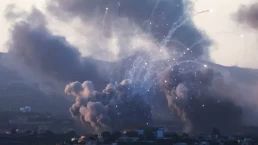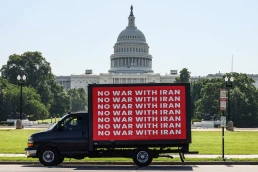“Lebanese civilians are paying the price,” says Aya Majzoub in Beirut, Amnesty International’s deputy director for the Middle East and North Africa, who calls Israel’s attacks “unprecedented” and “devastating.”
By Aya Majzoub , Amy Goodman, and Juan Gonzalez, Democracy Now!
The Israeli military is reportedly preparing to invade Lebanon while continuing to launch extensive airstrikes across the country, forcing tens of thousands to flee. Lebanon’s Health Ministry reports the death toll has reached at least 569 people, with more than 1,800 wounded. Israeli strikes have killed United Nations employees, medical workers, at least one journalist and 50 children over the past two days. Meanwhile, Hezbollah launched dozens of rockets at Israel, including a long-range missile fired toward Tel Aviv that was intercepted by Israeli air defense systems. “Lebanese civilians are paying the price,” says Aya Majzoub in Beirut, Amnesty International’s deputy director for the Middle East and North Africa, who calls Israel’s attacks “unprecedented” and “devastating.” “In a single day, on Monday, more than 500 people were killed. … It is one of the highest daily death tolls in recent global wars.”

Transcript
This is a rush transcript. Copy may not be in its final form.
AMY GOODMAN: At least 22 people have been killed in Lebanon today as the Israeli military continues its bombardment across Lebanon. Israel is expanding the zones of attack with strikes for the first time on the beach resort town of Jiyeh, just south of Beirut, and Maaysrah, in the mountains in the north. The death toll over the past three days is nearly 600 killed, including over 50 children, 40 women, with more than 1,800 people wounded. Tens of thousands have fled southern Lebanon, many going to Beirut and the coastal city of Sidon, and are sleeping in schools and parks, in their cars.
The U.N. High Commissioner for Refugees reports two United Nations staffers were among those killed by Israeli attacks on southern Lebanon. Ali Basma worked as a janitor at the UNHCR’s Tyre office for seven years before he was killed in an Israeli strike Monday. And Dina Darwiche, a 12-year staff member of UNHCR’s Beqaa office who was featured in UNHCR videos, was killed along with her son in an Israeli strike that seriously injured her husband and another of their children. Another Israeli strike killed cameraman Kamel Karaki of Al-Manar TV.
Meanwhile, Hezbollah launched dozens of rockets at Israel, including a long-range missile fired toward Tel Aviv that was intercepted by Israeli air defense systems.
The U.N. Security Council has scheduled an emergency meeting on Lebanon today at the request of France.
For more, we go to Beirut, where we’re joined by Aya Majzoub. She’s Amnesty International’s deputy director for the Middle East and North Africa.
Welcome to Democracy Now!, Aya. Since you’re right there in Beirut, just describe the scene on the ground in the country.
AYA MAJZOUB: I mean, the onslaught that started Monday was really unprecedented. We saw tens and tens and tens of thousands of families hastily pack up their bags, leave their homes, without any idea where they’re going to next. All across Beirut now, you see cars that are parked with displaced families that have nowhere to go. The strikes have been expanding. There’s a lot of misinformation around. People are paranoid about another pager or walkie-talkie attack. I mean, the situation is really devastating.
And, Amy, you know, I really want to put the death count into perspective here. In a single day, on Monday, more than 500 people were killed, and that is a really astounding number. It is one of the highest daily death tolls in recent global wars. It is higher than most daily death tolls in Gaza in the past year. You know, in Gaza, despite the horrific Israeli onslaught, it took 18 days for the death count to reach 500. This happened in Lebanon in about 24 hours. In 2006, the 33-day war that took place between Hezbollah and Israel resulted in 1,100 deaths over 33 days. We’ve already achieved half of that in just 24 hours. So the numbers are really unprecedented.
And you see a major panic across the entire country. People don’t know where is safe anymore. The Israelis have expanded the areas that they’re targeting. They’re not limited to some areas in south Lebanon along the border and in the Beqaa. They’ve really expanded inwards into coastal cities, into mountains in the north. It really feels like nowhere is safe, and people are very much at a loss for what to do and where to go.
JUAN GONZÁLEZ: And, Aya, what about these phone calls and text messages and also reports of dropping of leaflets on the population by the Israelis? How are people reacting to that? And what indication do they have of even where to go?
AYA MAJZOUB: So, on Monday, the information minister said that around 80,000 people received calls to evacuate. And we tried to look into some of those calls, and there didn’t seem to be any pattern for who was receiving these calls. Some people in Beirut received them. Some people in the south received them, in the Beqaa. It was really all across the country. So it seemed like a tactic that was more intended to cause fear rather than an actual evacuation.
Some residents in south Lebanon did get more specific evacuation orders. But again, under international law, for evacuation orders to mean anything, they have to be effective, meaning that people must have the time to leave, and they must have the means to do so. What we saw on Monday was anything but. I mean, the instructions that people got were stay away from Hezbollah targets. Nobody knows — a civilian doesn’t know where a Hezbollah target is. So people just fled with the clothes off their back. It took 14, 15 hours for some families to make it from south Lebanon to Beirut. And we were receiving reports that there were some strikes on, you know, near where civilians were gathered to evacuate, in traffic jams. We’re still looking into those. But if that holds up, then that is also a serious violation.
JUAN GONZÁLEZ: And I wanted to ask you — that Amnesty is calling for an international investigation into the deadly attacks using these exploding portable devices. Could you talk about what you’re calling for and why? And why isn’t this patently labeled as a terrorist attack?
AYA MAJZOUB: So, under international humanitarian law and human rights law, we don’t use the term “terrorist attacks.” For us, attacks are either lawful or unlawful. Our qualification of the pager attacks is if, as is being reported and as U.S. officials and Lebanese officials have said, Israel was behind the attacks, then international humanitarian law applies, because these attacks were part of an armed conflict. Under international humanitarian law, it is prohibited to use weapons indiscriminately, which we found that the pager attacks were. The people who detonated the pagers did not know who was given the pagers or the walkie-talkies, and they did not know who would be around the individuals carrying those pagers and walkie-talkies. Therefore, the attack was indiscriminate and, therefore, unlawful under international humanitarian law and should be investigated as a war crime.
The reason that Amnesty has called for an international investigation on this particular attack is because of the risks of this kind of warfare. It transforms everyday objects, like pagers and walkie-talkies, into essentially booby traps. And there is an explicit prohibition under international humanitarian law on the use of such booby traps. But we felt that such an attack, although it didn’t cause nearly the same number of casualties as Monday’s onslaught, did instill some fear and panic into the Lebanese society and is a really dangerous method of warfare to be using. It was unprecedented. And the involvement goes far beyond just, you know, the Israeli military. There are allegations around various shell companies. So we’re trying to look into all of the multifaceted aspects of this attack, but we do feel that an international investigation in this case is warranted.
AMY GOODMAN: I want to ask you, Aya Majzoub, if you consider this a war on Hezbollah or Israel’s war on Lebanon.
AYA MAJZOUB: I mean, in terms of the impact on civilians, it is undeniable that Lebanese civilians are paying the price. You know, a lot of the media coverage of Monday’s attacks was Israel strikes Hezbollah targets. However, you know, we’ve looked at entire neighborhoods that have been flattened, residential towers that have been brought down, people’s livelihoods, their shops, their homes, their cars, all in ruins. You mentioned the deaths of the two UNHCR staff members. The health minister also mentioned the deaths of four medics and paramedics. Ambulances are being hit, medical centers. And the wave of displacement from south Lebanon, the Beqaa and other areas is now, I think, almost 500,000 people have had to leave their homes. Not all 500,000 people are Hezbollah. So, the impact on Lebanese civilians has really been catastrophic.
AMY GOODMAN: And the response of the United States? President Biden just gave his last speech at the United Nations as U.S. president. He — let’s see — the EU foreign policy chief Josep Borrell has characterized this as almost a full-fledged war. President Biden said, “Too many on each side of the Israeli-Lebanon border remain displaced. Full-scale war is not in anyone’s interest.” Even though a “situation has escalated, a diplomatic solution is not [sic] possible.” He said “is still possible,” he said. Aya Majzoub, at the same time, the U.S. continuing to provide billions of dollars to the U.S. military — to the Israeli military.
AYA MAJZOUB: Yeah. I mean, there’s an obvious hypocrisy there. We consistently, since October 7, have been calling for the suspension of weapons sales and shipments to Israel. We’ve continued to call for respect of IHL. We have, in at least one instance, documented a possible war crime that Israel committed in Lebanon using U.S. weapons. So, if the U.S. really was serious about a deescalation in the region, then they should start by stopping arms and weapons shipments to Israel and by also supporting judicial criminal proceedings, including at the ICC.
AMY GOODMAN: Aya Majzoub, we want to thank you so much for being with us, Amnesty International’s deputy director for Middle East and North Africa, speaking to us from Beirut, Lebanon.
Next up, here in the U.S., Election Day is just six weeks away. We’ll be joined by the Green Party presidential and vice-presidential candidates, Jill Stein and Butch Ware. Stay with us.
Recent Posts
A War With Iran Would Not Be a One-Off Event But a Disastrous Ongoing Rupture
February 26, 2026
Take Action Now If Congress cedes its power to stop a war with Iran, it will fully erode any lingering promise of democratic restraint.By Hanieh…
New Addition to List of Nuclear Near Catastrophes
February 25, 2026
Take Action Now Debris flew for great distances — many times the distance of 270 meters to a nuclear reactor and nuclear storage facility.By David…
Gavin Newsom’s last budget belies his ‘California for All’ pledge
February 24, 2026
Take Action Now Yet, even as the state is poised to lose billions in federal funding, and millions of Californians are losing access to health care…
Israel and American Hawks are Pushing U.S. to Iran War With Catastrophic Consequences
February 23, 2026
Take Action Now At the World Health Assembly in May, member states may endorse an unprecedented strategy declaring that health is not a cost – but…




